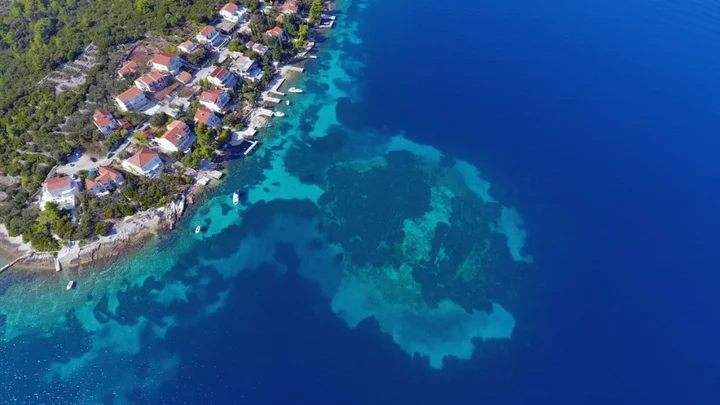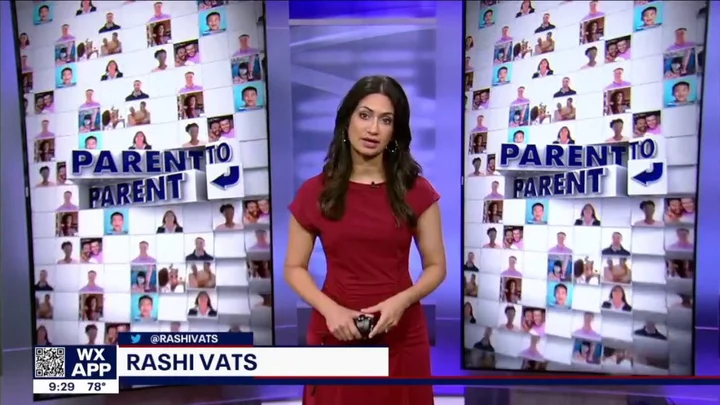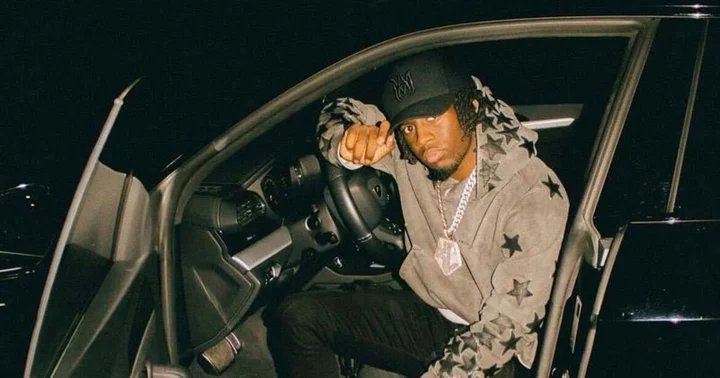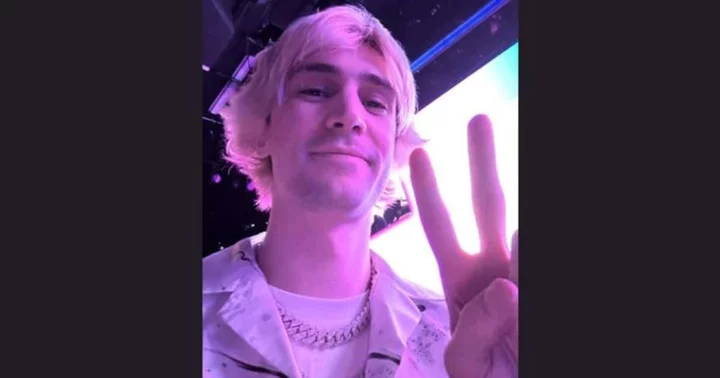
Hank Green: 2023 net worth of YouTuber diagnosed with cancer
Hank Green has generous earnings through his several social media channels
2023-05-20 16:21

G7 calls for adoption of international technical standards for AI
By Kantaro Komiya and Supantha Mukherjee TOKYO (Reuters) -Leaders of the Group of Seven (G7) nations on Saturday called for
2023-05-20 16:20

Did Jason Oppenheim and Marie-Lou get married? 'Selling Sunset' stars' latest pics spark wedding speculations
Fans were left baffled after Jason Oppenheim and Marie-Lou shared some stunning photos which seemed as if they got married
2023-05-20 15:51

Scientists 'surprised' by 'strange underwater road' discovered in Europe
It’s not quite the lost city of Atlantis, but scientists have just uncovered a slice of history that had been swallowed up by the sea. Experts admitted that even they were surprised when divers unearthed a 7,000-year-old stone road that had lain buried under layers of sea mud. The ancient structure was discovered after archaeologist Igor Borzić, of the University of Zadar, spotted “strange structures” nearly 16 ft (5m) underwater in the Bay of Gradina, off the coast of Croatia. The submerged road once linked the island of Korčula to an artificial, prehistoric settlement that belonged to a maritime culture known as the Hvar. Sign up for our free Indy100 weekly newsletter The university released footage of the incredible finding over the weekend. It showed the passageway which consisted of stacked stones and measured some 12 ft (around 4m) across. Archaeologists believe people walked this road “almost 7,000 years ago”, with radiocarbon dating of wood near the site suggesting the settlement may have been built around 4,900 BC. “In underwater archaeological research of the submerged neolithic site of Soline on the island of Korčula, archaeologists found remains that surprised them,” the University of Zadar said in a Facebook statement. “Namely, beneath the layers of sea mud, they discovered a road that connected the sunken prehistoric settlement of the Hvar culture with the coast of the island of Korčula.” Borzić and his team also discovered another “almost identical” settlement on the other side of Korčula Island. Neolithic artefacts including a stone axe, cream blades and sacrificial fragments, were found at the site which lay at a depth of 4-5m. Understandably, the researchers were delighted and, as they continue to delve into their nation’s past, we wonder what else they’ll unearth. Have your say in our news democracy. Click the upvote icon at the top of the page to help raise this article through the indy100 rankings.
2023-05-20 15:49

ExoHydraX: Controversial Twitch streamer reveals why she was permabanned
Before this permaban, ExoHydraX was already temporarily banned from Twitch due to broadcasting sexually suggestive content
2023-05-20 15:22

Factbox-Excerpts from G7 leaders' statement on economic coercion
Leaders of the Group of Seven (G7) agreed on Saturday to establish an initiative to counter economic "coercion",
2023-05-20 14:59

How much are 'TikTok challenges' to blame for recent tragedies?
The nefarious potential of digital technology has never been of greater concern. Artificial intelligence is already outsmarting us, and doxxing and deepfake are now firmly part of the common lexicon, so it’s no wonder we live in fear of what lies ahead for our kids. We already lament that young people live their lives as much on social media as they do in the real world, but to what extent can we blame these platforms for everyday mistakes and, even, tragedies? To answer that question, we must turn to two words which strike fear in the hearts of parents around the world. They are: “TikTok” and “challenge”. Sign up for our free Indy100 weekly newsletter To the uninitiated, trends and challenges are the lifeblood of the video-sharing app. What began as a lighthearted stage for lip-syncing and dance routines (originally called Musical.ly), is now a hive of endless hashtags, each one encouraging a new stunt or craze. TikTok’s algorithm is a formidable and unpredictable beast, with the power to propel content creators to global stardom and seven-figure earnings and churn out entire new brands. But while most of us can forgive the platform for inviting pink sauce and Charli d’Amelio into our homes, we will not forget its more sinister capabilities. Indeed, mums and dads not only have to contend with the influence of certain notorious brainwashers, but they also face the prospect of losing their child to a dangerous prank – all for the sake of a few likes and the fleeting respect of their peers. A number of serious injuries and deaths have now been attributed to misguided attempts at “trends” on the app, with the so-called “blackout challenge” alone deemed culpable for the deaths of at least 20 children aged 14 or under in the past two years, a Bloomberg Businessweek investigation found. Archie Battersbee, 12, was widely reported to have taken part in the self-choking craze before he was found unconscious by his mother back in 2022. He’d suffered a catastrophic brain injury and died four months later. Then, in April this year, 13-year-old Jacob Stevens passed away in hospital six days after taking on the “Benedryl challenge,” according to his grieving dad. And less than a month ago, 16-year-old Mason Dark was left “unrecognisable” with burns after creating a makeshift blowtorch as part of an alleged TikTok stunt. Yet, there is scant, if any, proof that the platform had any part in fuelling the tragedies suffered by each of these particular kids. In the case of Archie, an inquest found that there was “no evidence” to back up his mum’s fear that he’d been doing the blackout challenge. A police report concluded that the 12-year-old had accessed TikTok on his mobile phone on the day of his fatal accident, but officers had been unable to pinpoint exactly what he’d been watching. However, photos and videos downloaded from the device offered no indication that he’d expressed interest in any auto-asphyxiation material. Similarly, TikTok took centre stage in reports on Jacob’s death, but a spokesperson for the company told indy100: "We have never seen this type of content (meaning the Benadryl challenge) trend on our platform and have blocked searches for years to help discourage copycat behaviour.” And although it was almost universally reported that a "TikTok challenge" had inspired Mason to created his near-lethal flamethrower, no outlets were able to provide any details on this. Could it be that he got the idea from another source or platform? Indeed, YouTube hosts numerous make-your-own blowtorch videos, some of which date back a number of years –meaning many of these fad projects were around before TikTok even existed. Still, although TikTok claims that it carefully monitors hashtags so that it can block potentially damaging content, a quick search of “flamethrower challenge” by indy100 yielded at least five examples of creators brandishing dangerous homemade devices. Admittedly one of these was captioned: “Don’t try this at home,” but doesn’t that sound like a challenge in itself? Social media companies are under mounting pressure to protect their young users from online harms and to better enforce age restrictions. And yet, even with the employment of increasingly sophisticated AI and tens of thousands of human moderators, they seem to constantly fall short in their duties. Yet, just look at recent headlines and it’s clear that TikTok seems to be shouldering most of the blame. Perhaps this is because it is the platform of choice among the very young and impressionable – it’s the most popular app in the US, used by almost 70 per cent of 13 to 17-year-olds, according to one survey. But perhaps it’s also because TikTok’s biggest rival launched a major campaign to tarnish its reputation last year, and it's still suffering the repercussions. Meta hired one of the most influential Republican consulting firms in the US to turn the public against the platform, driving home the idea that the app was a danger to American kids and society. The firm, Targeted Victory, used a nationwide media and lobbying push to spread the message that TikTok was a “threat”, according to leaked emails seen by the Washington Post. Among its tactics was to promote dubious stories about alleged “TikTok trends” that, in fact, originated on Facebook, the paper noted. In another email, a staffer for Targeted Victory asked one of the company’s partners: “Any local examples of bad TikTok trends/stories in your markets? [The] dream would be to get stories with headlines like ‘From dances to danger: how TikTok has become the most harmful social media space for kids’”. Following the Post’s investigation, Meta spokesperson Andy Stone defended the campaign saying: “We believe all platforms, including TikTok, should face a level of scrutiny consistent with their growing success.” TikTok responded by saying it was “deeply concerned” about “the stoking of local media reports on alleged trends that have not been found on the platform.” And yet, for all its protestations of innocence when it comes to the housing of high-risk content, TikTok was essentially the architect of its own problems. Back in 2016, Alex Zhu – the co-founder of what was then Musical.ly – boasted that his app was different to its competitors thanks to its promotion of "daily challenges". Every day, the company set users a new task – whether that be a dance routine or a weight-lifting mission – each of which typically spawned more than one million videos, according to Bloomberg. When Musical.ly was bought by Bejing-based platform ByteDance in 2017, and the two merged to become TikTok, the challenges came with it. These trends struck a particular chord with teens stuck at home during the first wave of the Covid pandemic, and so TikTok staff did everything they could to boost interest, for example, by getting influencers to encourage involvement. When more and more dangerous crazes started to crop up (remember the “milk crate challenge”?), TikTok established a “harm spectrum” to help its moderators decide what should be removed, Eric Han, the company’s US head of safety told Bloomberg. Nevertheless, children may be naive but they’re not stupid, and they soon found ways to circumvent the filters and restrictions. Participants adopted new names and hashtags for the dares, in some cases using deliberate typos or code names to signpost their content. The challenges were also carried over to different platforms, infesting social media as a whole with the weird, whacky and outright life-threatening. And so, we come back to our original question: to what extent can we blame these platforms – and, more specifically, TikTok – for the mistakes, injuries and even deaths of the young? The answer is, this shouldn't be about apportioning blame but about taking responsibility and collectively doing everything we can to protect our children. The likes of Facebook, Instagram and, yes, TikTok, too, all need to do more to impose age limits and remove harmful content, and stop putting growth over the safety of their young users. However, we must also accept that kids will always find ways to break the rules, and it's up to us as family members and friends, to remind them that a cheap thrill in your social life isn’t worth losing your whole life over. Have your say in our news democracy. Click the upvote icon at the top of the page to help raise this article through the indy100 rankings.
2023-05-20 14:28

Amid a conservative takeover of a Florida liberal arts college, graduation attendees boo a former Trump adviser giving a keynote speech
Dr. Scott Atlas, a former adviser to President Donald Trump, was met with a flurry of boos, jeers and chants as he delivered a keynote speech during the graduation ceremony for the New College of Florida Friday night, amid a contentious conservative government takeover of the college.
2023-05-20 13:55

Kai Cenat: Twitch King shares thoughts on why he is not into dating
In 2022, Kai Cenat burst onto the Twitch world, outdoing competitors like xQc in terms of subscribers
2023-05-20 12:59

Pokimane: Twitch streamer 'graduates' from OfflineTV to take on mystery project
For over half a decade, Pokimane has been an integral part of OfflineTV, a tight-knit group of content creators and her close friends
2023-05-20 12:46

Why did xQc bash 'garbage' streamers in Rust at Twitch Rivals?
Why did xQc end the live stream? What happened in rust server?
2023-05-20 12:22

Sanctions against Russia and what the G7 may do to fortify them
The Group of Seven advanced economies are expected to announce more sanctions against Russia to further hinder its war effort in Ukraine during their summit in Hiroshima, Japan
2023-05-20 12:20
